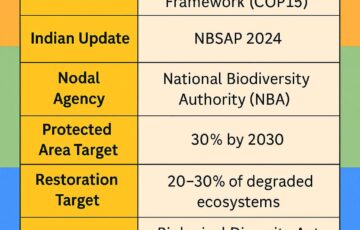India’s First Gene-Edited Sheep Born in Kashmir: A Milestone in Agricultural Innovation
India’s First Gene-Edited Sheep Born in Kashmir: A Milestone in Agricultural Innovation
Why in the News?
India’s first gene-edited sheep, developed using CRISPR-Cas9 technology at SKUAST-Kashmir’s Embryo Biotechnology Lab in Srinagar, marks a milestone in livestock biotechnology and agricultural innovation. The sheep’s myostatin gene was edited to enhance muscle mass, effectively acting as a genetic mass gainer, paving the way for future transgenic research and advancements in Indian sheep breeds, potentially affecting sheep price in India and overall livestock economics, including Indian goat breeds and prices.
Breakthrough in Livestock Genetic Engineering:
- The Sher-e-Kashmir University of Agricultural Sciences and Technology (SKUAST-Kashmir) in Srinagar has successfully created India’s first gene-edited sheep, showcasing the potential of animal biotechnology and advanced breeding techniques in the country.
- Using CRISPR technology, specifically CRISPR-Cas9, the team edited the real gene known as myostatin, a negative regulator of muscle growth, resulting in a 30% increase in muscle mass, demonstrating the potential of genetic mass gainers in livestock.
- The sheep, a Kashmir Merino breed, was born in December 2023 and has shown healthy growth, weighing 3.15 kg at birth, potentially impacting future sheep prices in India. This breakthrough could influence the economics of various Indian goat breeds and prices as well.
- Gene editing offers a way to produce disease-resistant animals and high-yield livestock, acting as a natural animal weight gainer. This is crucial in the context of India’s growing meat demand and wool production needs. As we know, sheep gives us wool, and this advancement could significantly affect the sheep wool price in the market.
The Team, Techniques, and Significance
- Led by Prof. Riaz Ahmad Shah, the project was carried out at SKUAST-Kashmir’s Embryo Biotechnology Lab, which serves as a cutting-edge sheep home for research, with scientists like Dr. Suhail Magray and Dr. Naresh Selokar, contributing to the advancement of agriculture in Kashmir.
- After three failed attempts, the team succeeded in July 2023, validating the results with gene sequencing and DNA modification techniques.
- The embryo was first lab-grown, then transferred to a surrogate mother, demonstrating advanced reproductive biotechnology techniques and the potential for reproductive cloning in livestock.
- The lab has a history of breakthroughs, including ‘Noori’, the world’s first cloned pashmina goat in 2012, highlighting SKUAST-Kashmir’s role in advancing livestock genetics. This achievement has had a significant impact on the pashmina goat price, showcasing the economic potential of such innovations.
Future of Transgenics and Biopharma Potential
- The lab is now progressing towards transgenics—inserting foreign genes to produce therapeutic proteins in animal milk, showcasing advancements in genomic science and potentially creating biological animal weight gainers.
- This could turn animals into biopharma factories, producing drugs like anti-cancer agents, demonstrating the potential of transgenic organisms in medicine.
- India’s push for high-quality, disease-resistant livestock is vital to meet rising agricultural and pharmaceutical demands, aligning with the goals of Indian agricultural research institutions. This includes developing animal weight gainers through genetic modification and exploring applications like gene-edited rice varieties.
- Prof. Shah emphasizes creating controlled biosecure zones to advance gene editing and transgenics responsibly, adhering to strict biosafety protocols and the evolving biotech regulatory framework in India.
Key facts: Kashmir Merino Sheep |
|
Key facts: Kashmir Merino Sheep |
|
● Developed in 1960 at Govt. Sheep Breeding & Research Farm, Reasi (Jammu). |
|
● A dual-purpose breed for both fine wool and meat production. |
|
● Cross-bred from native breeds (Poonchi, Gaddi, Bakerwal) and exotic breeds (Australian Merino, Delaine). |
|
● 3–4 times more productive than local breeds, showcasing successful breeding techniques. |
This breakthrough in gene editing and agricultural innovation demonstrates India’s growing capabilities in biotechnology and genomic science, potentially revolutionizing livestock breeding and management across the country. The success with the Kashmir Merino sheep opens doors for similar advancements in other breeds, such as Karnataka sheep and even European sheep breeds. Furthermore, this CRISPR technology could be extended to develop gene-edited rice varieties, showcasing the versatility of CRISPR-Cas9 technology in agricultural applications.
As research progresses, we may see the development of specialized tools like a texel app for sheep breeders, integrating genetic information and breeding strategies. The focus on muscle mass enhancement through genetic mass gainers could significantly impact the livestock industry, offering new possibilities for efficient meat production and improved animal health. This could have far-reaching implications for Indian goat breeds and prices, as well as the broader agricultural sector.






